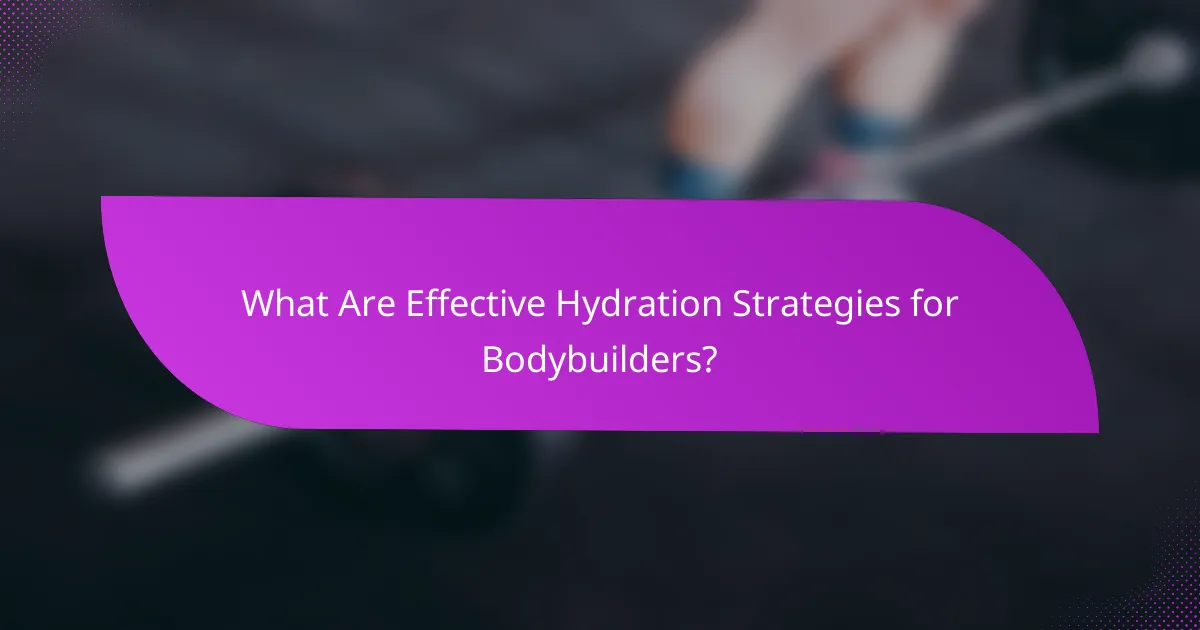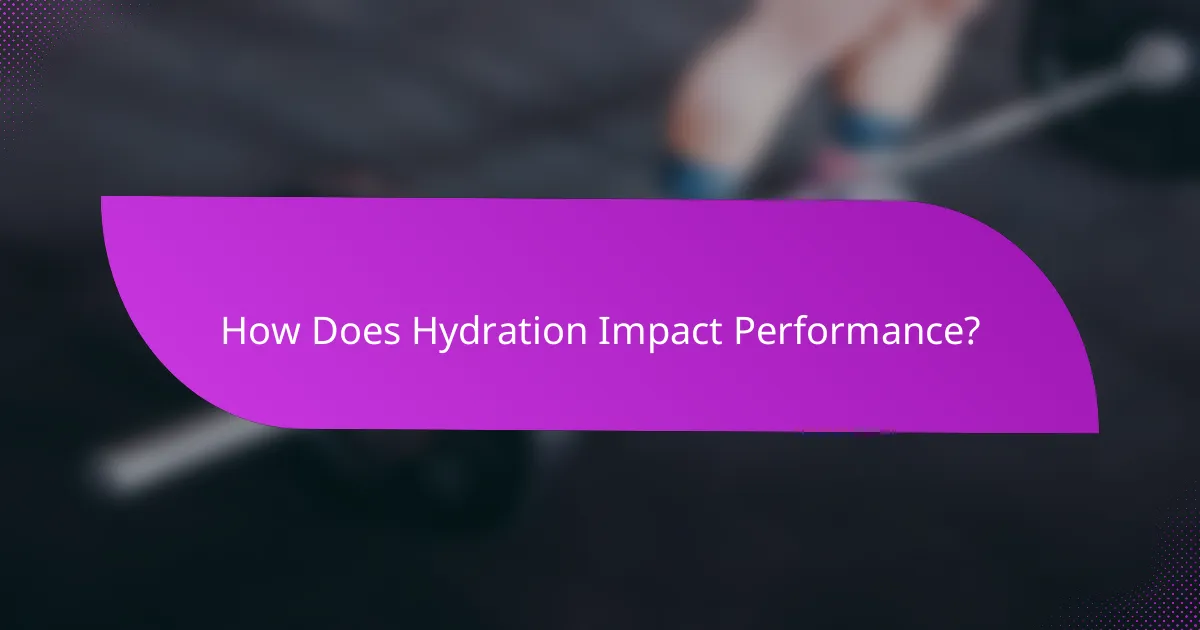Hydration is a critical component of bodybuilding, as it directly impacts performance, recovery, and overall health. Effective strategies involve maintaining optimal water intake, balancing electrolytes, and timing hydration around workouts. By adhering to these practices, bodybuilders can enhance their muscle function and minimize the risk of dehydration-related issues.

What Are Effective Hydration Strategies for Bodybuilders?
Effective hydration strategies for bodybuilders focus on maintaining optimal water intake, balancing electrolytes, and timing hydration around workouts. These practices enhance performance, recovery, and overall health, making them essential for serious athletes.
Consistent water intake
Consistent water intake is crucial for bodybuilders to support muscle function and recovery. Aim for a daily intake of around 3 to 4 liters, adjusting based on activity level, climate, and individual needs. Carry a water bottle to encourage regular sipping throughout the day.
Consider setting reminders or using a marked water bottle to track your intake. Staying hydrated can help prevent fatigue and improve workout performance.
Electrolyte supplementation
Electrolyte supplementation helps maintain fluid balance and muscle function, especially during intense workouts. Sodium, potassium, and magnesium are key electrolytes that can be lost through sweat. Incorporating electrolyte-rich foods or supplements can support hydration and performance.
Sports drinks or electrolyte powders can be beneficial, particularly during prolonged exercise. However, be mindful of sugar content and choose options that align with your dietary goals.
Pre- and post-workout hydration
Hydrating before and after workouts is essential for optimal performance and recovery. Drink about 500 mL of water 1-2 hours before exercising to ensure adequate hydration. Post-workout, aim to replenish lost fluids with at least 500 mL of water or an electrolyte drink.
Timing your hydration can help prevent dehydration and support muscle recovery, enhancing your overall training results.
Monitoring hydration levels
Monitoring hydration levels can help bodybuilders stay on track with their fluid intake. One simple method is to check urine color; pale yellow indicates proper hydration, while dark yellow suggests a need for more fluids. Additionally, pay attention to thirst cues and body signals.
Weighing yourself before and after workouts can also provide insight into fluid loss. A weight drop of more than 1-2% may indicate dehydration and the need for increased hydration strategies.
Using hydration apps
Hydration apps can assist bodybuilders in tracking their water intake and setting hydration goals. Many apps allow users to log daily fluid consumption and send reminders to drink water throughout the day. This can help establish a consistent hydration routine.
Look for apps that offer customizable features, such as tracking electrolyte intake or integrating with fitness trackers, to enhance your hydration strategy further.

How Much Water Should Bodybuilders Drink?
Bodybuilders should aim to drink between 3 to 4 liters of water daily, depending on their activity level, body size, and environmental conditions. Staying adequately hydrated supports muscle function, recovery, and overall performance.
General water intake guidelines
The general recommendation for water intake is about 2 to 3 liters per day for most adults, but bodybuilders often require more due to increased physical demands. A common guideline is to drink approximately half your body weight in ounces of water daily. For example, a 180-pound bodybuilder should aim for around 90 ounces (about 2.7 liters) of water each day.
Additionally, it’s beneficial to consume water before, during, and after workouts to maintain hydration levels. Monitoring urine color can also be a practical way to assess hydration; pale yellow indicates good hydration, while darker shades suggest a need for more fluids.
Factors affecting water needs
Several factors influence how much water a bodybuilder needs, including exercise intensity, climate, and diet. High-intensity workouts can lead to significant fluid loss through sweat, necessitating increased water intake. Hot and humid environments further exacerbate this need, as the body loses more fluids to regulate temperature.
Diet also plays a role; high-protein diets, common in bodybuilding, can increase water requirements due to the need for kidney function support. Foods with high water content, like fruits and vegetables, can contribute to overall hydration but should not replace water intake.
Hydration calculations based on weight
A practical method to calculate hydration needs is to use body weight as a basis. A common approach is to drink 0.5 to 1 ounce of water for every pound of body weight. For instance, a 200-pound bodybuilder might aim for 100 to 200 ounces (about 3 to 6 liters) of water daily.
Another useful calculation is to adjust water intake based on exercise duration. For every hour of intense training, an additional 1 to 1.5 liters of water may be necessary to replace lost fluids. Keeping a water bottle handy during workouts can help ensure consistent hydration.

What Role Do Electrolytes Play in Hydration?
Electrolytes are essential minerals that help regulate fluid balance, muscle contractions, and nerve function, making them crucial for effective hydration. Proper electrolyte levels can enhance performance and recovery in bodybuilding by preventing dehydration and muscle cramps.
Importance of sodium, potassium, and magnesium
Sodium, potassium, and magnesium are key electrolytes that play vital roles in hydration and muscle function. Sodium helps retain water in the body, while potassium aids in muscle contractions and nerve signaling. Magnesium supports energy production and muscle recovery, making it important for bodybuilders.
Maintaining a balance of these electrolytes is crucial, as deficiencies can lead to muscle cramps, fatigue, and impaired performance. Bodybuilders should monitor their intake to ensure optimal hydration and functionality during workouts.
Electrolyte balance during workouts
During intense workouts, electrolyte levels can drop significantly due to sweat loss. It is important to replenish these minerals to maintain performance and prevent dehydration. A general guideline is to consume electrolyte-rich beverages or supplements during prolonged exercise sessions, especially those lasting over an hour.
Monitoring signs of imbalance, such as muscle cramps or excessive fatigue, can help bodybuilders adjust their electrolyte intake accordingly. A practical approach is to consume a drink containing electrolytes every 30-60 minutes during workouts to sustain hydration levels.
Sources of electrolytes for bodybuilders
Bodybuilders can obtain electrolytes from various food sources and supplements. Foods rich in sodium include table salt, pickles, and canned soups. Potassium can be found in bananas, sweet potatoes, and spinach, while magnesium is abundant in nuts, seeds, and whole grains.
In addition to whole foods, electrolyte drinks and powders can provide a convenient way to replenish these minerals, especially during or after workouts. Choosing products with balanced sodium, potassium, and magnesium content can help maintain optimal hydration and performance levels.

How Does Hydration Impact Performance?
Hydration significantly influences athletic performance by affecting strength, endurance, and recovery. Proper fluid balance ensures optimal physiological function, which is crucial for achieving peak performance in bodybuilding and other sports.
Effects of dehydration on strength
Dehydration can lead to a noticeable decline in strength and power output. Even a small loss of body weight due to fluid loss, around 2-3%, can impair muscle function and reduce overall performance. This is particularly critical during high-intensity workouts where strength is paramount.
To maintain strength, aim to drink water regularly throughout the day and consider electrolyte-rich beverages during intense training sessions. Monitoring your body weight before and after workouts can help identify fluid loss and guide your hydration strategy.
Hydration and endurance performance
For endurance athletes, hydration is essential for sustaining performance over longer periods. Dehydration can lead to fatigue, decreased coordination, and increased perceived effort, which can hinder endurance capabilities. Maintaining fluid intake during prolonged activities is vital to prevent these negative effects.
A practical approach is to consume about 500-750 ml of water or an electrolyte drink for every hour of exercise, especially in hot conditions. Adjust your intake based on sweat rates and environmental factors to optimize endurance performance.
Hydration’s role in recovery
Post-exercise hydration plays a crucial role in recovery by aiding muscle repair and reducing soreness. Replenishing lost fluids and electrolytes helps restore balance and supports metabolic processes essential for recovery. Aim to drink at least 1.5 liters of fluid for every kilogram of body weight lost during exercise.
Incorporating hydration strategies such as consuming water or recovery drinks immediately after workouts can accelerate recovery. Additionally, consider including foods with high water content, like fruits and vegetables, to enhance overall hydration and nutrient intake.

What Are Common Hydration Mistakes?
Common hydration mistakes in bodybuilding can hinder performance and recovery. These errors often stem from misunderstanding water needs, ignoring body signals, and neglecting essential electrolytes.
Overhydration risks
Overhydration, or drinking excessive amounts of water, can lead to a condition known as hyponatremia, where sodium levels in the blood become dangerously low. This can cause symptoms ranging from nausea to severe neurological issues. Bodybuilders should aim for a balanced intake, typically around 2-3 liters per day, adjusting based on activity level and climate.
To avoid overhydration, monitor urine color; pale yellow indicates proper hydration, while clear urine may suggest excess intake. It’s crucial to listen to your body and drink when thirsty, rather than forcing large quantities of water.
Ignoring thirst signals
Ignoring thirst signals can lead to dehydration, negatively impacting strength and endurance. Thirst is a natural indicator that your body needs fluids, and neglecting it can result in decreased performance and increased fatigue. Bodybuilders should aim to drink water regularly throughout the day, not just during workouts.
A practical approach is to set reminders to drink water every hour or incorporate hydration into your routine, such as having a bottle nearby during training sessions. This ensures you stay hydrated without waiting for thirst to set in.
Neglecting electrolyte intake
Electrolytes, such as sodium, potassium, and magnesium, are vital for muscle function and hydration balance. Neglecting these can lead to cramps, fatigue, and impaired recovery. Bodybuilders should consider consuming electrolyte-rich foods or supplements, especially during intense training or in hot conditions.
A general guideline is to include sources like bananas, nuts, and sports drinks in your diet, particularly after workouts. Monitoring your electrolyte levels can help maintain optimal performance and prevent imbalances that could hinder your bodybuilding goals.



